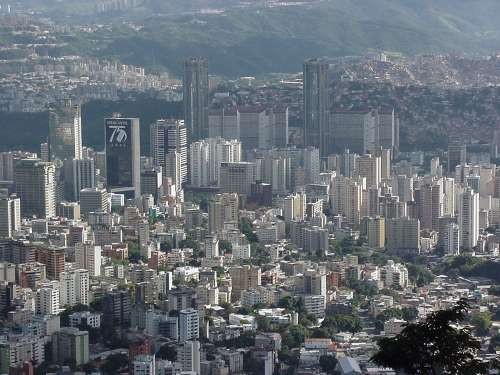Venezuela: Chavez Stops Inflation in its Tracks

Oh, I do get some joy when things like this happens. Readers will remember last week I called out the NY Times (and IHT) for running a ill-researched opinion piece off as news. The writer Simon Romero stated with complete assurance that Chavez's plan for fighting the increasingly problematic inflationary pressures would fall flat. "Demagoguery and showmanship will do nothing to solve Venezuela's 20 percent inflation rate...." he wrote.
Well today, Mr Romero has some serious explaning to do. Turns out Chavez's anti-inflation moves dropping the VAT tax have had an immediate effect even more positive than Chavez could have hoped. What was termed "runaway inflation" by the Western press the previous month appears to have suddely turned around. Bloomberg reports:
Venezuela Consumer Prices Unexpectedly Fell in March
By Guillermo Parra-Bernal and Theresa Bradley
April 2 (Bloomberg) -- Venezuelan consumer prices had their biggest monthly decline since at least 1990 in March after the government slashed the value-added tax on all consumer goods.
Consumer prices fell 0.7 percent last month, the central bank said today in an e-mailed statement. Only one of 12 economists surveyed by Bloomberg predicted a drop in prices. In February, prices rose 1.4 percent.
``In the short term, we're going to start to quickly see a decrease in inflationary pressures,'' Armando Leon, a central bank director, told reporters in Caracas today. He predicted inflation will continue to slow during the second quarter.
The government cut the value-added tax rate to 11 percent from 14 percent on March 1 to help ease a surge in consumer prices triggered by shortages of goods from foodstuffs to car parts. Economists such as Tania Reif of Citigroup Inc. said the effect of the tax reduction will be temporary and that a growing economy and restrictions on foreign exchange trading may push up inflation again in a few months.
Inflation for the 12 months through March slowed to 18.5 percent from 20.4 percent in February, compared with the 20.1 percent median estimate in the survey. Venezuela, where inflation has topped 10 percent a year since 1986, has the fastest pace of consumer price increases in Latin America.
``The behavior of the price index reflects the impact of the series of tax measures taken by the government last month, as well as recent adjustment in some regulated prices and the substantial improvement in the supply'' of certain consumer goods, the central bank said the statement.
...
Food prices fell 4.7 percent in March, the bank said. Telecommunications prices, including cell phone fares, dropped 2.6 percent and the cost of transportation fell 0.3 percent.
Whole thing

4 Comments:
You really DON'T understand how economics works, do you... Of course prices dropped because a built in part of that price has been removed. It is only a temporary solution. The "Demagoguery and showmanship" was refering to the slashing of 0's from the currency which did NOTHING to change anything. These are two different issues, but then again making distinctions doesn't suit your apologist agenda.
No JSB, it is you who does not know what a Value Added Tax (VAT) is. It is a tax placed only on foreign imports. The inflation pressures were not being caused directly by the price of foreign goods. If you read the likes of Romero and NY Times, they tell us that the inflation pressures were a result of Government spending and domestic price controls. So yes maybe the price of selected foreign goods dropped, but nobody predicted this kind of immediate effect (ok well 1 of 12 Bloomberg economic experts did). So for you to say "of course prices dropped" is disingenous at best.
The fact that the original Times article did not mention the VAT reduction is just another stain on their journalism, not mine. Why did they not include it I wonder?
Once again, it is YOU who do not understand simple economics. Please research "Value Added Tax" and you'll see that it is "...applied to the value added to the goods at each stage of production" and is irrelevant to whether that transaction is from abroad or from resources in Venezuela. It is regressive and I applaud the move. And yes, of course the prices dropped because there were immediate reductions in the cost to middlemen, distributors, vendors, etc... Again, I'm not sure why anyone can take you seriously given your shallow understanding of how the real world works.
And do you believe that dropping zeros from the currency will help the economy? I wonder why you've failed to discuss that. Isn't it because that was simply a cosmetic move without any real economic benefit?
Again, I applaud the reduction of the VAT and would recommend that it is scrapped all together. I've never met a tax cut I didn't like. I bet sooner rather than later, the Venezuelan gov't will drop it entirely in order to maintain control over growth. Mark my words.
Ok, ok I muffed this one. I know what a VAT is, having lived in England, but for some reason just used the first link that popped up. A VAT is also paid on customs though besides each link in the production.
The cutting off zeroes and introducing the old bolivar fuerte coin are psycological measures. As currency valuation is based on the security one feels in the Bolivar. The true test to see if that had some impact will be next month, don't you agree? If the VAT had an immediate effect (that again only 1 of 12 predicted - I doubt you would have been that bullish - you neglected that argument) then to sustain the declining inflation next month would be a result of the other moves. We'll see...
Post a Comment
Subscribe to Post Comments [Atom]
<< Home